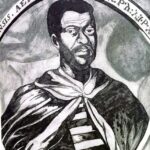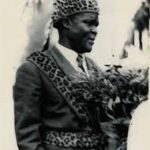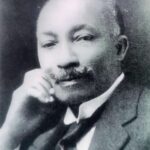LANSANA, DAVID
- 3 Min Read
David Lansana (March 27, 1922-July 19, 1975) was the first Sierra Leonean to be commissioned into the Royal (now Republic of) Sierra Leone Military Forces, later to become its first Sierra Leonean brigadier and force commander.

PHOTO CAPTION: Lansana David. SOURCE: EA Library
In 1967 he participated in an abortive coup détat but was quickly overthrown by his own officers. (The coup aimed at preventing Siaka Stevens from coming to power, and at reinstating Sir Albert Margai and the Sierra Leone People’s Party (S.L.P.P.J.). He was convicted of treason and executed in 1975.
Born on March 27, 1922, at Baiima in the Mandu chiefdom, Kailahun district, he was educated first at Central School and Union College, Bunumbu, Kailahun district, Eastern Province. He then went to Eaton Hall, Cheshire, England, and finally to the Officers’ Training School at Chester, England. He enlisted in the army as an officer cadet in 1947, and for five years was commissioned. On January 1, 1965, he was made brigadier and force commander of the Royal Sierra Leone Military Forces.
Following the general elections of 1967, Brigadier Lansana declared martial law. He broadcast to the nation on March 21, explaining his action. The elections, he said, had “reflected not political opinions but tribal differences.”
After the election of ordinary members, while the elections of the 12 paramount chiefs had yet to take place, the two major political parties, the All Peoples Congress and the Sierra Leone Peoples’ Party had broken even, each holding 32 seats, with the Independents holding two. Neither had the required majority of 40. Lansana went on to say that tension was building up and that, as chief of state security, he had twice interviewed the governor-general to inform him that a dangerous situation would be created if he made any appointment (of a prime minister) when neither party had a majority and the elections had still not been concluded.” After a third interview, he reported, the governor-general decided to make an appointment despite the brigadier’s warning that he would not be able to handle the situation that might arise from such an unconstitutional act.
In conclusion, he stated: “I want to make it clear that the Army and I say this after consultation with my senior officers- does not, I repeat, not intend to impose a military government on the people of Sierra Leone. This country has a record of constitutional government.”
His account of both of the figures involved and the constitutional issues raised was not entirely accurate. Not long after his broadcast, the army seized power; the brigadier was arrested by his senior officers, the Constitution was suspended and a military regime called the National Reformation Council was formed. Brigadier Lansana was later given a diplomatic appointment in New York.
In 1968, a revolt of non-commissioned officers in the army toppled the N.R.C. government and reinstated the government of Siaka Stevens, which had already been sworn in by the governor-general the previous year when the armed forces declared martial law.
Brigadier Lansana left New York to seek asylum in Liberia but was extradited at the request of the Sierra Leone government to face charges of illegal assumption and exercise of certain powers. He was convicted and sentenced to five years’ imprisonment in 1968.
In 1973 he was released, only to be arrested again shortly after on a treason charge, along with Mohamed S. Forna and 14 other people. After a lengthy trial, Brigadier Lansana was convicted with Forna and others and was executed at Pademba Road Prisons on July 19, 1975.
CYRIL P. FORAY





